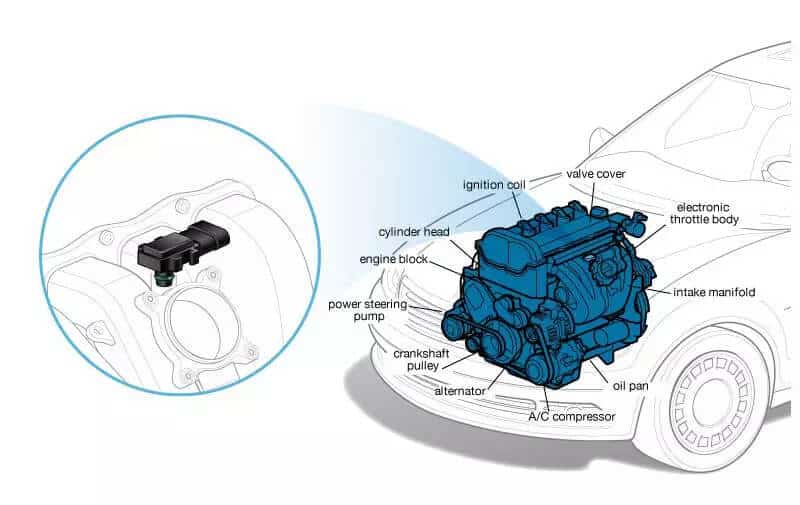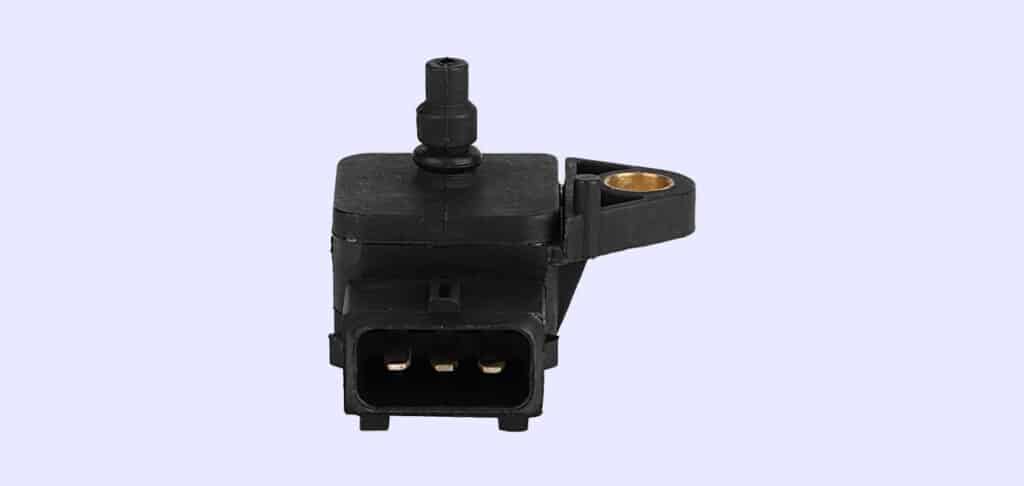If you’re experiencing engine performance issues, it’s possible that your Manifold Absolute Pressure (MAP) sensor is faulty. The MAP sensor is a critical component of the engine management system that measures the pressure in the intake manifold and helps the engine computer determine the correct air/fuel mixture. In this article, we’ll cover everything you need to know about replacing a faulty MAP sensor, including cost and labor time.
What is a Manifold Absolute Pressure Sensor?
The Manifold Absolute Pressure (MAP) sensor is a device that measures the pressure inside the intake manifold. It sends the information to the engine control module (ECM), which then adjusts the air/fuel mixture for optimal engine performance.

How Much Will it Cost to Replace a Manifold Absolute Pressure Sensor in Canada?
The cost of replacing a Manifold Absolute Pressure (MAP) sensor in Canada can range from $100 to $400, including parts and labor. The labor time can vary depending on the make and model of your vehicle and the location of the sensor.
What are the Symptoms of a Faulty Manifold Absolute Pressure Sensor?
Symptoms of a faulty manifold absolute pressure (MAP) sensor can vary, but some common signs include:
1. Poor engine performance: A malfunctioning MAP sensor can lead to issues such as rough idling, hesitation, stalling, or misfires, affecting overall engine performance.
2. Reduced fuel efficiency: A faulty MAP sensor can cause the engine control module (ECM) to make incorrect adjustments to the air-fuel mixture, resulting in reduced fuel efficiency and increased fuel consumption.
3. Check engine light: A malfunctioning MAP sensor can trigger the check engine light, indicating a problem with the sensor or related systems.
4. Increased emissions: A faulty MAP sensor can cause increased emissions due to improper combustion, potentially leading to failed emissions tests or environmental harm.
5. Hard starting or poor acceleration: A malfunctioning MAP sensor can affect engine responsiveness, making the vehicle difficult to start or causing sluggish acceleration.
6. Unusual noises: A faulty MAP sensor can cause the engine to produce unusual noises, such as knocking or pinging sounds, due to improper combustion.
How Long Does a Manifold Absolute Pressure Sensor Last?
A Manifold Absolute Pressure (MAP) sensor can last anywhere from 100,000 to 150,000 kilometers, but this can vary depending on driving conditions and how often the vehicle is serviced.
How does a Manifold Absolute Pressure Sensor Become Defective?
A manifold absolute pressure (MAP) sensor can become defective due to various factors, including:
1. Wear and tear: Over time, the MAP sensor can wear out or degrade due to constant exposure to heat, pressure changes, and engine vibrations.
2. Contamination: Dirt, dust, or debris can accumulate on the sensor or within the vacuum hose connected to it, impairing its ability to provide accurate readings.
3. Corrosion: Moisture or chemicals in the engine bay can cause corrosion on the sensor’s electrical contacts or wiring, leading to signal loss or intermittent functionality.
4. Electrical issues: Wiring or connection problems, such as damaged wires, corroded connections, or loose connectors, can result in intermittent or complete loss of signal from the MAP sensor to the engine control module.
5. Damage from external factors: The MAP sensor’s location in the engine bay makes it susceptible to damage from external factors such as collisions, extreme temperature fluctuations, or exposure to harsh chemicals.
6. Manufacturing defects: In some cases, a sensor may have inherent manufacturing defects that cause it to fail prematurely. Replacing the faulty sensor with a high-quality component can help ensure reliable performance.
How A Faulty Manifold Absolute Pressure Sensor can affect other systems in the car?
• Engine performance: A faulty MAP sensor can lead to poor engine performance, causing rough idling, hesitation, stalling, or misfires.
• Fuel efficiency: A malfunctioning MAP sensor can result in incorrect air-fuel mixture adjustments, leading to reduced fuel efficiency and increased fuel consumption.
• Emissions: A faulty MAP sensor can cause increased emissions due to improper combustion, potentially leading to failed emissions tests or environmental harm.
• Ignition timing: A malfunctioning MAP sensor may affect ignition timing, resulting in poor engine performance and responsiveness.
• Transmission shifting: A faulty MAP sensor can impact transmission shifting patterns, leading to rough or erratic gear changes.
• Damage to engine components: In severe cases, a faulty MAP sensor can cause damage to the engine or catalytic converter due to improper combustion and increased emissions.
Is it Safe to Drive with a Faulty Manifold Absolute Pressure Sensor?
Driving with a faulty manifold absolute pressure (MAP) sensor can lead to various performance and efficiency issues, potentially affecting the safety of your vehicle. The MAP sensor is responsible for monitoring the air pressure within the intake manifold, providing crucial data to the engine control module (ECM) to optimize fuel delivery, ignition timing, and air-fuel mixture. A malfunctioning MAP sensor can result in poor engine performance, reduced fuel efficiency, and increased emissions.
While it may not be immediately dangerous to drive with a faulty MAP sensor, doing so can result in a number of issues that can compromise your vehicle’s safety and reliability. A malfunctioning MAP sensor can cause the engine to run too lean or too rich, leading to rough idling, stalling, hesitation, or misfires. These issues can affect the vehicle’s overall performance and responsiveness, particularly during acceleration or when driving uphill. In more severe cases, a faulty MAP sensor can even cause damage to the engine or catalytic converter due to improper combustion and increased emissions. To maintain the safety and reliability of your vehicle, it is recommended to address any MAP sensor issues as soon as possible.

How Can I Make My Manifold Absolute Pressure Sensor Last Longer?
To make your Manifold Absolute Pressure (MAP) sensor last longer, you should:
• Keep your air filter clean
• Regularly service your vehicle
• Avoid driving on rough roads
• Avoid driving through water
Conclusion
The Manifold Absolute Pressure (MAP) sensor is a critical component of your engine management system, and a faulty sensor can lead to engine performance issues. If you experience any of the symptoms mentioned above, it’s important to have your MAP sensor checked by a professional mechanic. The cost of replacing a faulty MAP sensor can vary, but it’s a small price to pay to ensure your engine is running at optimal performance.
Next Steps
Book Your Manifold Absolute Pressure Sensor Replacement Service
The service most frequently booked by those who read this article is Manifold Absolute Pressure Sensor Replacement. Uchanics’ expert technicians make the process even more convenient by bringing the service right to your doorstep. We perform this job at your home or office, covering over 40 cities in Ontario, including Oshawa, Ajax, Toronto, Scarborough, Mississauga, Brampton, and more. Our commitment to excellence has earned us more than 700 glowing 5-star reviews. Choose Uchanics for your Manifold Absolute Pressure Sensor Replacement and experience unparalleled convenience and top-quality service.
